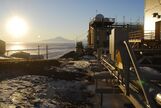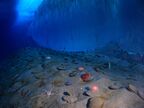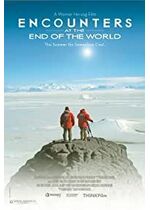-
Werner Herzog: The National Science Foundation had invited me to Antarctica even though I left no doubt that I would not come up with another film about penguins.
-
Stefan Pashov: I've explored many different lands of the mind and many worlds of ideas, and I started before I even knew how to read and write. My grandmother was reading the Odyssey and the Iliad to me. So I started my journey in my fantasy before I even knew the means of accomplishing it, but my mind and my psyche was ready for it. I was already travelling with Odysseus and with the Argonauts and to those strange and amazing lands. That always stayed with me, that fascination of the world, and that I fell in love with the world. It's been very powerful, and it's been with me this whole time.
-
Stefan Pashov: And I think there's a fair amount of the population here who're full time travelers and part time workers. So, yes those are the professional dreamers, they dream all the time. And I think, through them the great cosmic dreams come into fruitition because the universe dreams to our dreams. I think that there is many different ways for the reality to bring itself forward, and dreaming is definitely one of those ways.
-
Doug MacAyeal: Might as well be on a piece of the South Pole but yet I'm actually adrift in the ocean, a vagabond floating in the ocean, and below my feet I can feel the rumble of the iceberg, I can feel the change, the cry of the iceberg, as it's screeching and as it's bouncing off the seabed, as it's steering the ocean currents, as it's beginning to move north. I can feel that sound coming up through the bottoms in the my feet and telling me that this iceberg is coming north. That's my dream.
-
Doug MacAyeal: Unlike Scott and Shackleton, who viewed the ice as this sort of static monster that had to be crossed to get to the South Pole, we scientists now are able to see the ice as a dynamic living entity that is sort of producing change, like the icebergs that I study. For me it's been a wild wide. First of all I found out that the iceberg that I came down to study not only was larger than the iceberg that sank the Titanic, it was not only larger than the Titanic itself, but it was larger than the country that built the Titanic. That's pretty big.
-
Werner Herzog: McMurdo has climate-controlled housing facilities, its own radio station, a bowling alley, and abominations such as an aerobic studio and yoga classes. It even has an ATM machine.
-
Samuel S. Bowser: The creatures that are down there are like science fiction creatures. They range in the way that they would gobble you up from slime-type blobs, but creepier than classic science fiction blobs - these would have long tendrils that would ensnare you, and as you try to get away from them you just become more and more ensnared by your own actions. And then after you would be frustrated and exhausted, then this creature would start to move in and take you apart. So that's one example of one of the creatures, then there are other types of worm-type things with horrible mandibles and jaws and just bits to rend your flesh.
-
Werner Herzog: I noticed that the divers in their routine were not speaking at all. To me, they were like priests preparing for mass. Under the ice the divers find themselves in a separate reality where space and time acquire a strange, new dimension. Those few who have experienced the world under the frozen sky often speak of it as going down into the cathedral.
-
William Jirsa: I like to say, if you take everybody who's not tied down they all sort of fall down to the bottom of the planet, so that's how we got here, you know. We're all at loose ends, and here we are together. I remember when I first got down here I sort of enjoyed the sensation of recognizing people with my travel markings. I was like, hey, these are my people. PhDs washing dishes and linguists on a continent with no languages.
-
Werner Herzog: In the stupid trend of academia, it would be better to let the language die than to preserve it.
-
William Jirsa: So just imagine 90% of languages will be extinct probably in my lifetime. It's a catastrophic impact to an ecosystem to talk about that kind of extinction. Culturally we're talking about the same thing, I mean, you know, what if you lost all of Russian literature, or something like that. If you took all of the Slavic languages and they just went away. No more Tolstoy.
-
Werner Herzog: It occurred to me that in the time that we spent with him in the greenhouse possibly three or four languages have died. In our efforts to preserve endangered species we seem to overlook something equally important. To me, it's a sign of a deeply disturbed civilization, where tree-huggers and whale-huggers in their weirdness are acceptable, while no one embraces the last speakers of a language.
-
Werner Herzog: For me, the best description of hunger is the description of bread. A poet said that once I think. For me, the best description of freedom is what you have in front of you. You're travelling a lot.
-
Werner Herzog: The rules for the humans are do not disturb or hold up the penguin. Stand still and let him go on his way. And here, he's heading off into the interior of the vast continent. With 5,000 kilometers ahead of him, he's heading towards certain death.
-
Werner Herzog: For this and many other reasons, our presence on this planet does not seem to be sustainable. Our technical civilization makes us particularly vulnerable. There is talk all over the scientific community about climate change. Many of them agree, the end of human life on this earth is assured. Human life is part of an endless chain of catastrophies, the demise of the dinosaurs being just one of these events. We seem to be next.
-
Werner Herzog: As if we had wanted to leave one remnant of our presence on this planet, they would find a frozen sturgeon mysteriously hidden away beneath the mathematically precise true south pole. They stash it back away into its frozen shrine for another eternity.
-
Peter Gorham: The neutrino is the most ridiculous particle you could imagine. A billion neutrinos went through my nose as we were talking. A trillion, a trillion of them went through my nose just now. And they did nothing to me. They passed through all of the matter around us continuously in a huge, huge blast of particles that does nothing at all. They almost exist in a separate universe, but we know as physicists we can measure them, we can make precise predictions and measurements. They exist, but we can't get our hands on them.
-
[last lines]
Stefan Pashov: There is a beautiful saying by an American philosopher, Alan Watts. He used to say that through our eyes the universe is perceiving itself, and through our ears the universe is listening to its cosmic harmonies. And we are the witness to which the universe becomes conscious of its glory, of its magnificence.
-
Werner Herzog: Is there such a thing as insanity in a penguin?
Encounters at the End of the World Quotes
Extended Reading
Encounters at the End of the World
Director: Werner Herzog
Language: English,Spanish Release date: July 18, 2008






